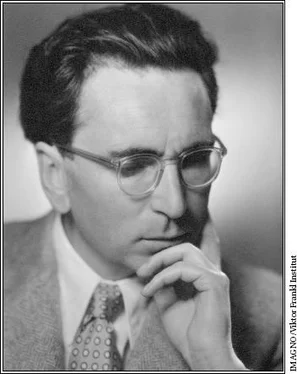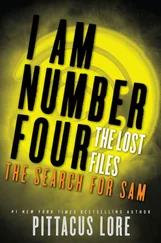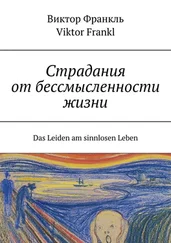I had none of this in mind when I wrote the book in 1945. And I did so within nine successive days and with the firm determination that the book should be published anonymously. In fact, the first printing of the original German version does not show my name on the cover, though at the last moment, just before the book’s initial publication, I did finally give in to my friends who had urged me to let it be published with my name at least on the title page. At first, however, it had been written with the absolute conviction that, as an anonymous opus, it could never earn its author literary fame. I had wanted simply to convey to the reader by way of a concrete example that life holds a potential meaning under any conditions, even the most miserable ones. And I thought that if the point were demonstrated in a situation as extreme as that in a concentration camp, my book might gain a hearing. I therefore felt responsible for writing down what I had gone through, for I thought it might be helpful to people who are prone to despair.
And so it is both strange and remarkable to me that—among some dozens of books I have authored—precisely this one, which I had intended to be published anonymously so that it could never build up any reputation on the part of the author, did become a success. Again and again I therefore admonish my students both in Europe and in America: “Don’t aim at success—the more you aim at it and make it a target, the more you are going to miss it. For success, like happiness, cannot be pursued; it must ensue, and it only does so as the unintended side-effect of one’s dedication to a cause greater than oneself or as the by-product of one’s surrender to a person other than oneself. Happiness must happen, and the same holds for success: you have to let it happen by not caring about it. I want you to listen to what your conscience commands you to do and go on to carry it out to the best of your knowledge. Then you will live to see that in the long run—in the long run, I say!—success will follow you precisely because you had forgotten to think of it.”
The reader may ask me why I did not try to escape what was in store for me after Hitler had occupied Austria. Let me answer by recalling the following story. Shortly before the United States entered World War II, I received an invitation to come to the American Consulate in Vienna to pick up my immigration visa. My old parents were overjoyed because they expected that I would soon be allowed to leave Austria. I suddenly hesitated, however. The question beset me: could I really afford to leave my parents alone to face their fate, to be sent, sooner or later, to a concentration camp, or even to a so-called extermination camp? Where did my responsibility lie? Should I foster my brain child, logotherapy, by emigrating to fertile soil where I could write my books? Or should I concentrate on my duties as a real child, the child of my parents who had to do whatever he could to protect them? I pondered the problem this way and that but could not arrive at a solution; this was the type of dilemma that made one wish for “a hint from Heaven,” as the phrase goes.
It was then that I noticed a piece of marble lying on a table at home. When I asked my father about it, he explained that he had found it on the site where the National Socialists had burned down the largest Viennese synagogue. He had taken the piece home because it was a part of the tablets on which the Ten Commandments were inscribed. One gilded Hebrew letter was engraved on the piece; my father explained that this letter stood for one of the Commandments. Eagerly I asked, “Which one is it?” He answered, “Honor thy father and thy mother that thy days may be long upon the land.” At that moment I decided to stay with my father and my mother upon the land, and to let the American visa lapse.
VIKTOR E. FRANKL
Vienna, 1992
I
EXPERIENCES IN A
CONCENTRATION CAMP
THIS BOOK DOES NOT CLAIM TO BE an account of facts and events but of personal experiences, experiences which millions of prisoners have suffered time and again. It is the inside story of a concentration camp, told by one of its survivors. This tale is not concerned with the great horrors, which have already been described often enough (though less often believed), but with the multitude of small torments. In other words, it will try to answer this question: How was everyday life in a concentration camp reflected in the mind of the average prisoner?
Most of the events described here did not take place in the large and famous camps, but in the small ones where most of the real extermination took place. This story is not about the suffering and death of great heroes and martyrs, nor is it about the prominent Capos—prisoners who acted as trustees, having special privileges—or well-known prisoners. Thus it is not so much concerned with the sufferings of the mighty, but with the sacrifices, the crucifixion and the deaths of the great army of unknown and unrecorded victims. It was these common prisoners, who bore no distinguishing marks on their sleeves, whom the Capos really despised. While these ordinary prisoners had little or nothing to eat, the Capos were never hungry; in fact many of the Capos fared better in the camp than they had in their entire lives. Often they were harder on the prisoners than were the guards, and beat them more cruelly than the SS men did. These Capos, of course, were chosen only from those prisoners whose characters promised to make them suitable for such procedures, and if they did not comply with what was expected of them, they were immediately demoted. They soon became much like the SS men and the camp wardens and may be judged on a similar psychological basis.
It is easy for the outsider to get the wrong conception of camp life, a conception mingled with sentiment and pity. Little does he know of the hard fight for existence which raged among the prisoners. This was an unrelenting struggle for daily bread and for life itself, for one’s own sake or for that of a good friend.
Let us take the case of a transport which was offcially announced to transfer a certain number of prisoners to another camp; but it was a fairly safe guess that its final destination would be the gas chambers. A selection of sick or feeble prisoners incapable of work would be sent to one of the big central camps which were fitted with gas chambers and crematoriums. The selection process was the signal for a free fight among all the prisoners, or of group against group. All that mattered was that one’s own name and that of one’s friend were crossed off the list of victims, though everyone knew that for each man saved another victim had to be found.
A definite number of prisoners had to go with each transport. It did not really matter which, since each of them was nothing but a number. On their admission to the camp (at least this was the method in Auschwitz) all their documents had been taken from them, together with their other possessions. Each prisoner, therefore, had had an opportunity to claim a fictitious name or profession; and for various reasons many did this. The authorities were interested only in the captives’ numbers. These numbers were often tattooed on their skin, and also had to be sewn to a certain spot on the trousers, jacket, or coat. Any guard who wanted to make a charge against a prisoner just glanced at his number (and how we dreaded such glances!); he never asked for his name.
To return to the convoy about to depart. There was neither time nor desire to consider moral or ethical issues. Every man was controlled by one thought only: to keep himself alive for the family waiting for him at home, and to save his friends. With no hesitation, therefore, he would arrange for another prisoner, another “number,” to take his place in the transport.
Читать дальше












